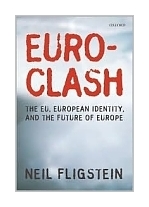|
||
• wydawnictwa polskie
• Zamów informacje o nowościach z wybranego tematu • kontakt
• Cookies na stronie |
EUROCLASH: THE EU EUROPEAN IDENTITY AND THE FUTURE OF EUROPEFLIGSTEIN N.wydawnictwo: OXFORD UN , rok wydania 2009, wydanie Icena netto: The European Union's market integration project has dramatically altered economic activity around Europe. This book presents extensive evidence on how trade has increased, jobs have been created, and European business has been reorganized. However, changes in the economy have been accompanied by dramatic changes in how people from different societies interact. In this book Neil Fligstein argues provocatively that these changes have produced a truly transnational-European-society. The book explores the nature of that society and its relationship to the creation of a European identity, popular culture, and politics. Much of the current political conflict around Europe can be attributed to who is and who is not involved in European society. Business owners, managers, professionals, white-collar workers, the educated, and the young have all benefited from European economic integration, specifically by interacting more and more with their counterparts in other societies. They tend to think of themselves as Europeans. Older, poorer, less-educated, and blue-collar citizens have benefited less. They view the EU as intrusive on national sovereignty, or they fear its pro-business orientation will overwhelm the national welfare states. They have maintained national identities. There is a third group of mainly-middle class citizens who see the EU in mostly positive terms and sometimes-but not always-think of themselves as Europeans. It is this swing group that is most critical for the future of the European project. If they favor more European cooperation, politicians will oblige. But, if they prefer that policies remain wedded to the nation, European cooperation will stall. Written in anaccessible style this is a major new interpretation of the drive to European integration and essential reading for all those with an interest in the topic. Neil Fligstein is the Class of 1939 Chancellor's Professor in the Department of Sociology at the University of California, Berkeley. He is the author of five books and over 50 papers. He has made scholarly contributions to the fields of organizational and economic sociology, political sociology, and the study of the European Union. His most recent books include The Architecture of Markets (Princeton University Press, 2001) and The Institutionalization of Europe (with Alec Stone Sweet and Wayne Sandholtz, Oxford University Press, 2001. Table of Contents
List of Figures List of Tables 1 The Dynamics of European Society 1 2 Constructing Markets and Politics: The Formation of the European Union, 1958-2004 33 3 The Economic Transformation of Europe 62 4 The Creation of Markets: The Cases of the Defense, Telecommunications, and Football Industries 89 5 Who Are the Europeans? 123 6 What is European Society? 165 7 The Structure of European Politics 208 8 Conclusions 242 References 254 Index 267 296 pages , Paperback Księgarnia nie działa. Nie odpowiadamy na pytania i nie realizujemy zamówien. Do odwolania !. |


